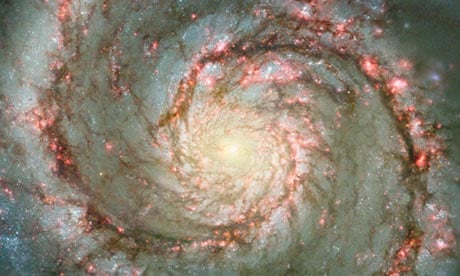As a scientist, I like to feel as if I am exploring a cosmic mystery of the greatest significance. I am awestruck by the beauty that saturates the laws of physics and suppose that what I am doing is rather more than merely helping to solve an elaborate crossword puzzle. Or perhaps I am just too optimistic – brashly engaging in an ultimately futile attempt to lift my spirits in the face of a meaningless and eternal oblivion.
Fortunately, I don't spend much time on the horns of that dilemma, although that did briefly change recently when I had the privilege to attend a conference on the banks of Lake Geneva organised by Wilton Park, a forum for international dialogue, in partnership with Cern. The event drew together particle physicists, cosmologists, theologians and philosophers in the name of dialogue and mutual understanding. Some might say that Cern should stick to science but I don't agree. A major reason for the popularity of fundamental physics is that it is seen to tackle some pretty "deep" questions – the kinds of questions that really "mean" something – and the quest for meaning is not something best left to scientists. With the latest ideas in physics seeming to suggest the possibility of "a universe from nothing" (the title of cosmologist Lawrence Krauss's latest book), the stakes do seem rather high. I think it makes sense to ensure that the theologians are up to speed with the science, but I also think that scientists benefit from contemplating the wider implications of their discoveries.
By overstating science's power and not acknowledging its limitations, we risk fostering the growth of a religion-substitute, with the scientists as high priests. Such hubris not only irritates people, but more significantly it risks promoting the misconception that science deals with certainty – and that is the very antithesis of good science. Science, which advances through the weight of evidence, is inherently uncertain. Sometimes, the evidence is so overwhelming that it would be unreasonable to doubt it; at other times, it is equivocal and harder to interpret. There is no doubting that science is supreme in its domain. How a microchip works is not a matter of opinion; equally, we have an excellent grasp of how atoms operate, while the evidence that the Big Bang took place 13.7 billion years ago is compelling. If we want to figure out how something works, then science is usually the tool for the job – from the action of an electric motor to what happened at the birth of the universe.
But the questions that science can tackle are nonetheless limited in scope. For most people, the deep questions of science do not shape their lives. For example, science does not touch on whether the universe has any point to it and it cannot even hope to answer the question of why there is something rather than nothing.
In recent years, physicists have begun to anticipate that the matter that composes the entire visible universe might have been created spontaneously – a mere consequence of the instability of empty space. Superficially, then, it might seem that we have the answer: there is something rather than nothing because "nothing" is unstable (rather in the way that a pencil balancing precariously on its point is unstable). That is pretty exciting stuff, but it isn't really an answer to the question and, in any case, "nothing" in quantum physics is far from that – it is a seething maelstrom of activity, to the extent that one might view the substantial universe we inhabit as the froth on top. Awestruck as I am by the laws of physics, no amount of wishful thinking can allow me to make the mistake of supposing that a law by itself can ever create anything. In addition to being unable to conjure up material existence, the laws of physics cannot create meaning either.
In some people's minds, science and religion stand in stark opposition, but is this really the case? Certainly, years of being a scientist have led me to doubt pretty much everything I thought I knew. Secure and certain knowledge is a rare thing and I am not surprised that scientists often find religious faith hard to swallow. That said, scientists do often act with what seems to me to be something like faith: a faith in scientific truths perhaps or in the humbling significance of nature's beauty. Perhaps "faith" is too strong – enthusiastic optimism might be better. Whatever the case, the importance of science lies not only in fighting ignorance and the building of better theories – it is important too because of the way it inspires glory and wonder. In that regard, at least, science and religion are united.

Comments (…)
Sign in or create your Guardian account to join the discussion